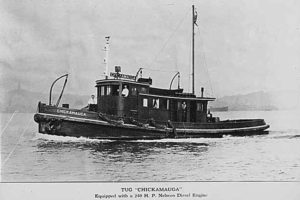Yet another vessel has sunk at its dock, this one in Eagle Harbor at Bainbridge Island. Chickagmauga was designed by Ted Geary and built in 1915. Read the excellent account by the Bainbridge Island Review’s Brian Kelly. Link to original story here. Details on the sinking can also be found on the Review’s website. -KH
Sunken ‘Chickamauga’ was on Washington Heritage Register, had storied past in timber times
By BRIAN KELLY, Bainbridge Island Review Editor
The old tugboat that sank Tuesday in Eagle Harbor had a rich historical past in the waters of Puget Sound.
The hull of the nearly 100-year old “Chickamauga” disappeared beneath the waters of the harbor early Tuesday, with the top half of the vessel still visible at its mooring spot at the Eagle Harbor Marina.
Karl House, a researcher with the Puget Sound Maritime Historical Society, said the tugboat was the first American-designed and built diesel-powered tugboat in the United States.
Built in 1915, the vessel was placed on the Washington Heritage Register for its significant historic value. It was built as ships were making the transition from steam to diesel engines and, at the time of its construction, diesel engines were still in their infancy and had only been patented 17 years before the “Chickamauga” was built.
he boat was commissioned by Arthur McNealy, manager for the Pacific Tow Boat Company, and construction of the vessel started June 24, 1914 at the Neilson and Keliz Shipyard in Everett, according to documents on file with the Washington Heritage Register.
The vessel cost $7,700 to build, and was designed by famed boat designer L.E. “Ted” Geary, who is well-known for his designs of racing sloops and yachts through the 1920s.
The boat’s diesel engine — a “Nlseco” Model 4 built by the New London Ship & Engine Company — was the first ever installed on an American tugboat. The “Chickamauga” was also the first in the country to have a powered towing wench (invented by H.S. Studdert, port engineer for the Pacific Tow Boat Company).
According to the Washington Heritage Register, the vessel’s original diesel engine was replaced in 1929 with an Atlas engine, which was later replaced by another Atlas engine, and then, an Enterprise.
Eventually, a Caterpillar diesel engine with three times the power of the original engine was installed in 1969.
But House, with the Puget Sound Maritime Historical Society, said that engine was just too much for the wooden boat, which had been since been renamed “Sea Chicken.”
“The Caterpillar was much more power than that old wooden hull could handle,” House said.
Much of the boat has been modified over its long use as a working tug. The original deckhouse and wheelhouse were replaced with a high wheelhouse around 1953.
The “Chickamauga” was noted for its ability to haul large log rafts in its working life during Washington’s timber era.
A.W. McNealy, manager of Pacific Tow Boat Company, once wrote of the tugboat, “During the six years she has towed over a billion and a half feet of logs, at times handling in one tow as many as 14 sections, which, when one considers the great size of the Puget Sound timber, indicates a heavy load.”
Even more incredible, McNealy said the tug never lost a tow of logs.
House said the “Sea Chicken” operated out of Everett for some time by Foss Maritime, which retired the vessel in 1974 and restored its original name, “Chickamauga.”
House, who described himself as an “old tow boat guy,” noted that he was very familiar with the tugboat after she was retired.
It was moored on Lake Union for a very long time, and House recalled having a pleasure boat that was moored across from her.
“She rarely ever went anywhere,” he said.
According to an 1974 article by Ken Ayers in “The Sea Chest,” the journal of the Puget Sound Maritime Historical Society, the “Chickamauga” did not originally boast the large stack that can be seen on the current vessel that some thought inspired her name. When built, the exhaust was along the side.
“This side exhaust (which was wet) shoots down a likable old theory that the vessel got her name from the sound of her exhaust which, being a four-cycle, was supposed to have said, ‘CHICKAMAUGA, CHICKAMAUGA’ and so on,” Ayers wrote.
“Actually, the wet exhaust probably said, ‘hoomf-whoosh-glub glub” which would have been a lousy name for a tugboat.”
“Another old timer around these parts tells me she was named ‘Chickamauga’ because way back in 1912 the old steam tug ‘Milwaukie’ ran over the tug ‘Argo’ of the Pacific Tow Boat Company. While the ‘Milwaukie’ won the argument with the ‘Argo,’ she lost the argument in court thus providing the wherewithal to build a new tug boat for Pacific Tow Boat,” Ayers wrote.
“It was reported that the owners of Pacific Tow Boat were so pleased that as a neighborly gesture they named the tug ‘Chickamauga’ as the general offices of the Chicago and Milwaukie Railroad were located on a lake of that name. This story also goes down the scuppers as the Milwaukie people tell me their offices have been in Chicago for more than 100 years and Lake Chickamauga is in Tennessee. So we have a hunch somebody in Pacific Tow Boat had a granddad or uncle who fought in the Battle of Chickamauga.”
